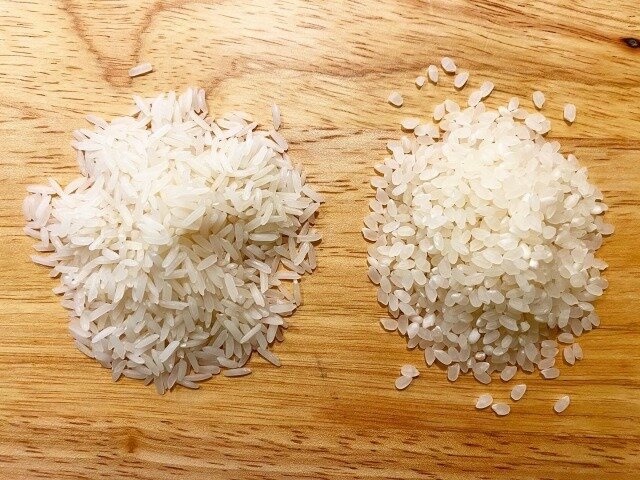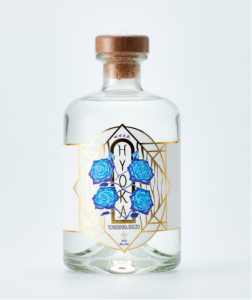Characteristics and Appeal of Awamori
Awamori is a traditional distilled spirit produced in Okinawa Prefecture. With origins dating back to the Ryukyu Kingdom, awamori is classified as a type of honkaku shochu, though its production methods and characteristics differ significantly from other types. Made from Thai rice and following a distinctive production process, awamori embodies Okinawa's rich cultural and historical heritage.
1.Unique Raw Material: Thai Rice
The primary ingredient of awamori is Thai rice (Indica rice), characterized by its long, slender grains and high starch content, which distinguishes it from Japanese rice (Japonica rice). Using Thai rice has been a tradition since the Ryukyu Kingdom, reflecting Okinawa's historical trade with Southeast Asia. The dense starch structure and low water absorption of Thai rice make it ideal for creating awamori’s distinctive aroma and flavor.

(Left :Indica rice and Right :Japonica rice)
2.Distinctive Production Method: All-Koji Process
A hallmark of awamori production is the “all-koji method,” where all the Thai rice used is converted into koji. Unlike other shochu types, the rice is not steamed; instead, it is simply washed before use. This method promotes robust fermentation and imparts a unique depth of flavor to awamori.
3.Black Koji Mold: A Key Ingredient
Awamori exclusively uses black koji mold, a tradition dating back to the Ryukyu Kingdom. Black koji is well-suited to Okinawa’s hot and humid climate, boasting strong fermentation power and the ability to produce large amounts of citric acid. This citric acid prevents the growth of unwanted bacteria and plays a crucial role in developing awamori’s distinctive aroma and taste.
4.Regional Distinctions
Awamori production spans Okinawa Prefecture, with a concentration of distilleries in the central and southern parts of the main island as well as on surrounding islands. Variations in regional climates and water quality give rise to diverse flavors. Notable production areas include Shuri, Naha, and Ishigaki Island, where distilleries maintain traditional methods to craft high-quality awamori.

(Okinawa Prefecture)
5.Flavor Profile
The flavor of awamori varies significantly between fresh spirits and aged varieties (kusu). Fresh awamori is characterized by a bold aroma and robust flavor, showcasing the distinct fragrance and rich umami of Thai rice, with a crisp finish.
6.Characteristics of Aged Awamori (Kusu)
Aged for three years or more, kusu features a mellow aroma and deep flavor. Longer aging, particularly beyond 10 years, yields a golden-hued spirit with a complex bouquet and a velvety smoothness.
7.Aging Methods
The aging process greatly influences awamori’s characteristics. Traditionally, aging was done in ceramic jars, which promote gradual oxidative aging and contribute to a rounded flavor. Modern methods include aging in stainless steel tanks or wooden barrels, each imparting unique qualities to the final product.
8.High Alcohol Content
Awamori typically has an alcohol content ranging from 30% to 43%, higher than most distilled spirits. This high alcohol level ensures durability in Okinawa's warm and humid climate while maintaining a surprisingly smooth drinking experience.
9.Ways to Enjoy Awamori
Awamori can be enjoyed in various ways:
On the Rocks: Showcases the pure aroma and flavor of awamori.
With Water (Mizuwari): Dilutes the strength while preserving the taste, making it accessible.
Warm (Nurukan): Especially recommended for aged kusu, enhancing its rich aroma and flavor.

(HYOKA)
10.Pairing with Cuisine
Awamori pairs excellently with Okinawan cuisine and Japanese dishes in general. Its versatility complements fish dishes and savory, salt-forward preparations. Additionally, aged kusu serves as a popular after-dinner digestif.
11.Cultural Significance
Awamori holds deep cultural importance in Okinawan traditions and ceremonies. It is indispensable for weddings, funerals, and seasonal events such as New Year celebrations and Obon festivals. Efforts to preserve awamori culture are evident in initiatives like “Kusu Day” (August 1), promoting its heritage and growth.
12.Modern Innovations
In recent years, awamori producers have embraced innovation while respecting tradition. Research into new aging methods, the development of awamori-based cocktails, and other creative applications have catered to contemporary tastes. Internationally, awamori, particularly aged kusu, is gaining recognition as a premium spirit.
13.Conclusion
Awamori is a distilled spirit that embodies Okinawa’s history and culture. Its unique production methods and aging processes result in a profound depth of flavor that captivates aficionados worldwide. As one of Japan’s representative spirits, awamori continues to gain acclaim domestically and abroad. By balancing tradition with innovation, awamori stands poised to expand its cultural and culinary impact for years to come.


